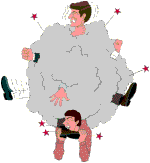
| A Han tradition is to teach and encourage individuals not to be easily
offended by other's words when they reach 60. Sixty is the age of
maturity in a high level, like the senior year at college (of life). Have you
reached that kind of maturity yet (more likely not, just kidding), or are you going to?
|
| It is the word that pleases, angers, saddens, comforts, intimidates,
encourages, discourages, enlightens, confuses, conveys love, shows hatred,
assures, deceives, pacifies, provokes, makes sense, or misleads.
A word could have many different meanings. When listening, be sure you really know what the speaker really means, and not what you think what he means. Words are to explain and deliver thoughts, but words can also be used to confound and bewilder. Words are more of an art than a science. Words are not precise nor accurate. The same word may come with different meanings and definitions. Not just listen to the words, but also examine the context, the emotion, the speaker's intended definition, the understanding, the perspective, the unspoken, and the self-interests involved. Without this process, words have too many different meanings, or words have no meanings at all. Think hard what does it really mean, and do not assume you know it already, no matter how educated you are or how many books articles even dictionaries you have ever read. There are blind spots in everybody. The master deceivers know very well about it, and they use words to gain advantages. He may be using a different "personal dictionary" from yours if you have one (most people do not have it). Remember someone said before "There is no such word 'impossible' in my dictionary." Got it? It is not ordinary dictionaries we ordinary people use everyday. So an independent thinker or listener has value here. For the same reasons, when you (the encoder) talk, do not assume the listener (the decoder) really understand what you really mean. The more sophisticated you are, the more difficult for others to really understand. They might resent you for this, because few people enjoy being less intelligent. Use only a few simple words, if you have to speak. Do not show off too much, if you are really good, and you would make less enimies. |
| The synonym of a word may present the same meaning in different ways
positively and negatively. Knowing the synonym will foster deeper
understandings of the meaning, and broaden the perspective. It might
be possible to find the synonym and the antonym of a word happen to be
the same. (Getting weird here, just take it as an joke, ok?)
It is assumed that everything has the other half. Heavens have Earth. Good men have bad men. Sun has moon. Day has night. Fire has water. Right has left. Upside has downside. Inside has outside. And female has male. When the female finds the other half, the male, they combine merge unite and become one and complete; and they begin to produce the miracle of life. So if we do not know the antonym of words, we would miss the other half of the world. Learning the antonym will help make us complete, wise, and mature. |
